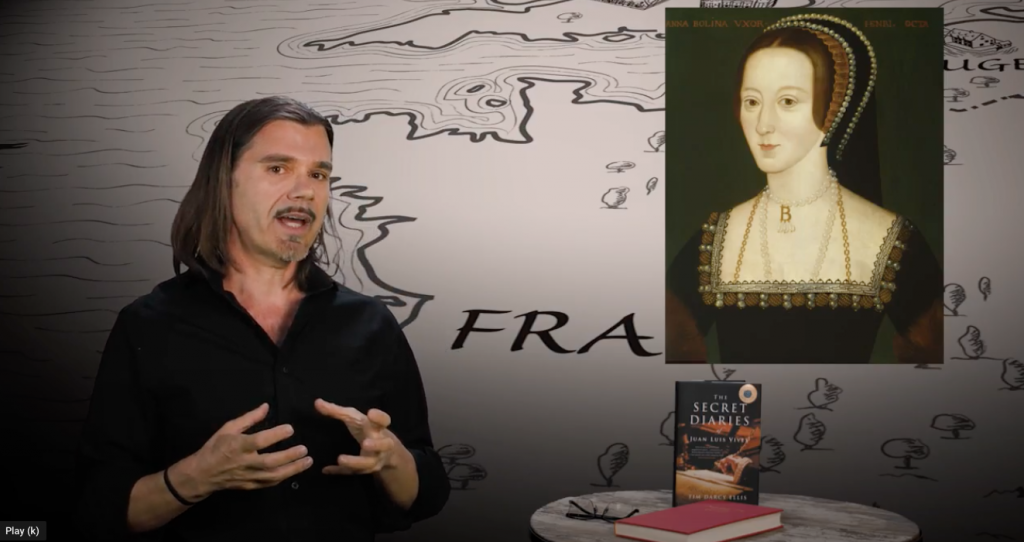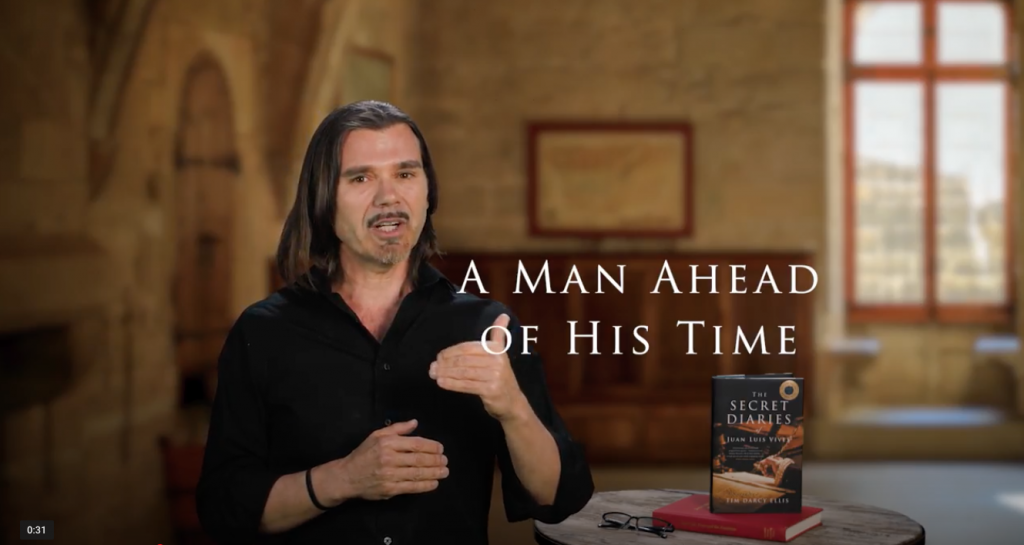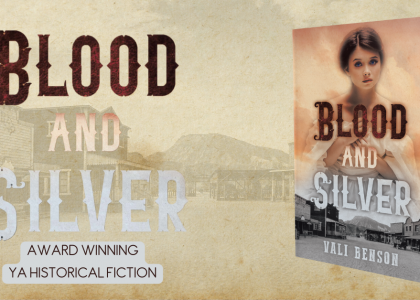Rave reviews and major publicity for Tim Darcy Ellis – Tellwell’s October author of the month

Tell us about yourself.
Well, I have a busy life! I write historical fiction, I run a business and I work as a physiotherapist. I was born in Sussex, England, brought up in Surrey and now live in Sydney, Australia. I was formerly a professional archaeologist – being graduate of the University of York, and having worked at the Museum of London in the late 1980s and early 1990s; I was also a tour guide at the British Museum.
I have been lucky enough to have enjoyed a few careers. I qualified as a physiotherapist in London in 1998. Whilst studying for my physio degree, I worked as a chef for four years at the Covent Garden Brasserie, which is now the site of the west end apple store! I moved to Australia in 2000, the year of the Sydney Olympics; thinking that it would be a temporary move, but I have been here ever since. Currently, I have my own holistic Physiotherapy and Wellness centre (Excel Physiotherapy and Wellness) in Sydney.
I live in Elizabeth Bay, which is in the eastern suburbs of Sydney, and I love it here. I have a partner and a dog. I love getting away from town though for ocean swimming, bushwalking and rock climbing. I’m passionate about history, archaeology and philosophy and I love the variety of media forms available now – books, audio, podcasts. Reading history and archaeology is my main relaxation and my escape.
What inspired you to write your book?
I’ve always been a writer – be it poetry, short stories, memoir, health and wellness or just letters to the press. I had been writing a lot before I discovered my character; the day I found him was a revelation and I decided that I just had to write about him.
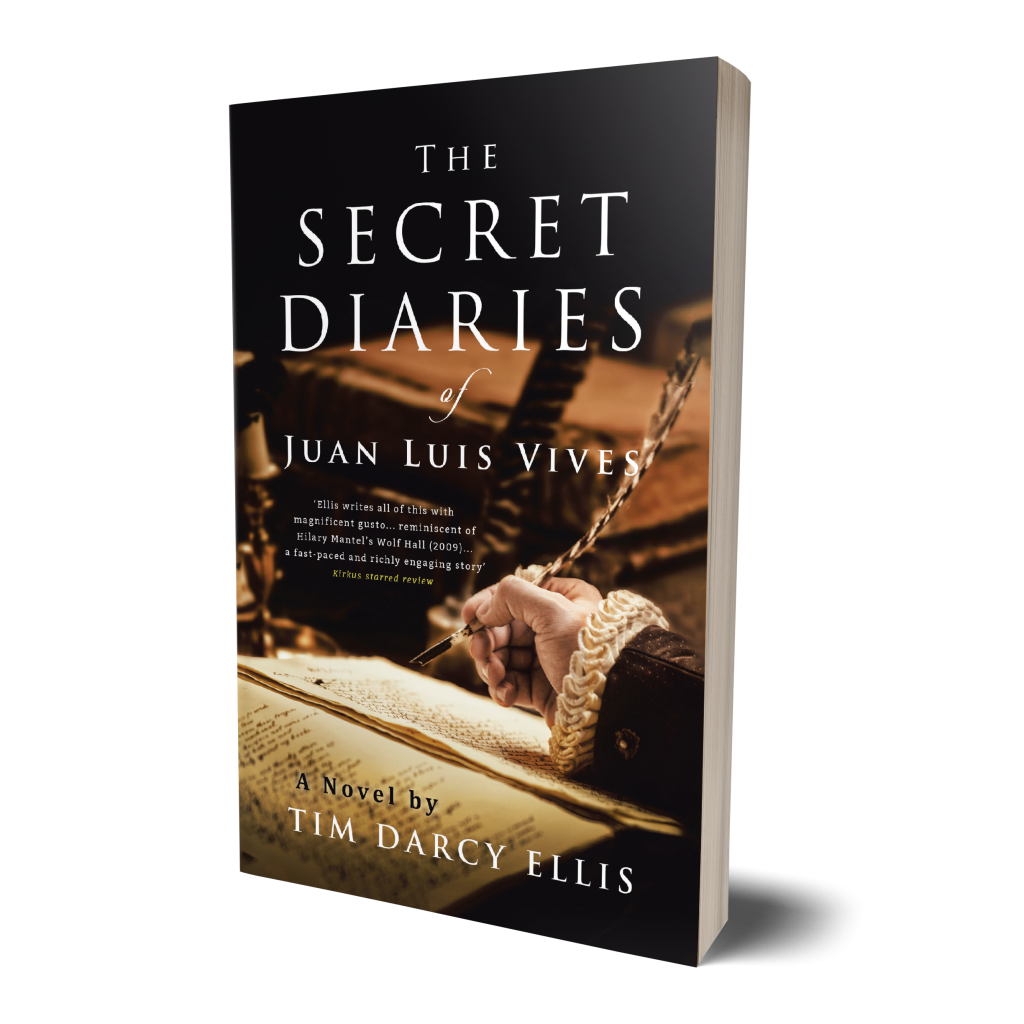
That said, I discovered Juan Luis Vives by mistake. I’d never heard of him until I gave a Spanish friend in Australia a book about exiles from Spain and I thumbed through it first and found out about this incredible man.
His life-story became my inspiration. It then became my mission to bring him back into the light and writing a novel rather than a non-fiction book allowed me to give him a human voice. As a Spanish Jew, he had to hold so much back in his academic writing and yet you can still feel the struggles that he endured. By writing in an intimate diary format, I could give the man himself a voice. That was a privilege, because Vives, forgotten by the mainstream, really contributed to making the world a better place.
Who is Juan Luis Vives and how did you become interested in his story?
Juan Luis Vives was born to a family of Spanish Jews in Valencia in 1492. His family were faced with an excruciating choice: leave Spain permanently or stay and convert to Catholicism. The family decided to stay and convert – a decision that they would later come to regret – as one-by-one they were ‘picked-off,’ by the Spanish Inquisition, for the crime of ‘Judaising.’ He left Spain at the age of sixteen – never to return for fear of the Inquisition. He moved to Paris and then to Flanders, and he eventually came to the English (Tudor) Court of Henry VIII and Catherine of Aragon. There he became tutor to Princess Mary and he became closely acquainted with the well-known characters of the English court such as Thomas More, Anne Boleyn and Cardinal Wolsey.
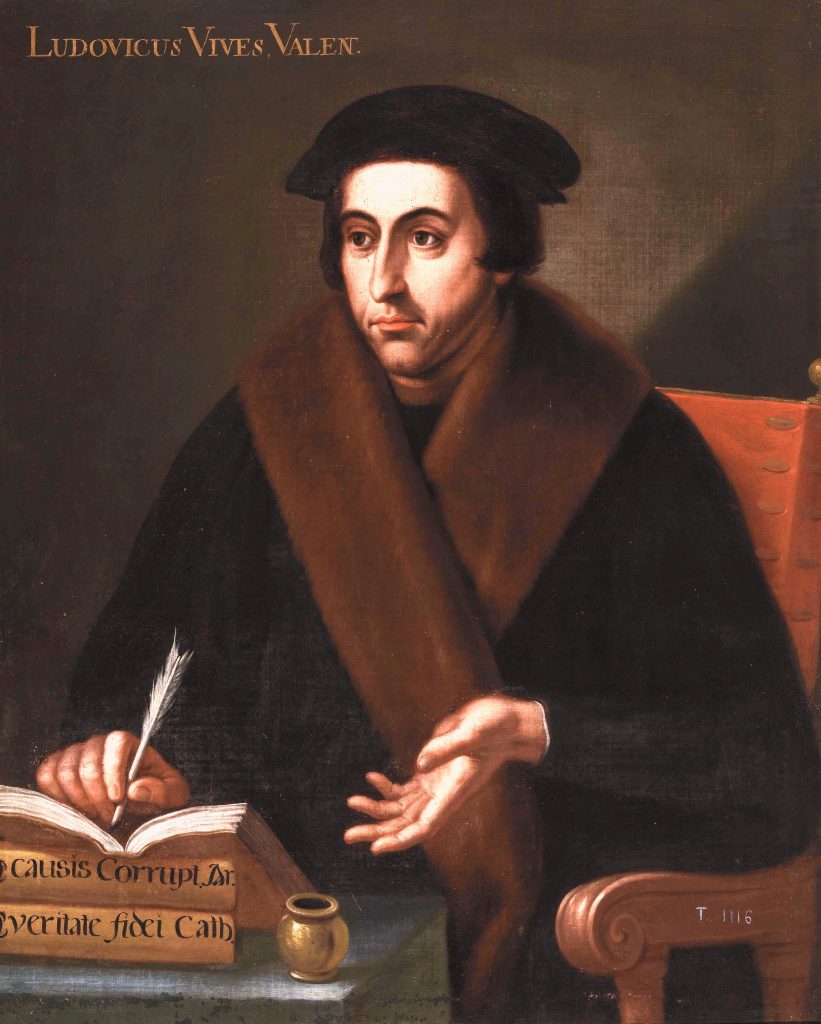
Vives spoke about ideas that were quite revolutionary in the 1520s. He was a great scholar, writer and teacher. His ideas encompassed the rights and equality of women, the necessity for peace over war – at all costs – and the cessation of sedition, oppression and persecution. He advocated for state-funded schools, skill-training and hospitals for all; regardless of class. Vives hated lofty, pretentious academic speech. He studied his subjects closely, and he spoke about syndromes such as ‘post-traumatic stress disorder,’ and addiction to such an extent that he has been named the Godfather of Psychoanalysis (Zilboorg, 1941). He also wrote about care of the animals – that they experienced emotions and had memories – quite revolutionary for his day.
All the while, he was struggling with great internal conflict. He was always keeping one step ahead of the Spanish Inquisition and staying out of danger himself. He was also trying to help his family and his people, who were still in Spain.
I have created this educational video for YouTube to explain, in greater detail and depth, the man who was Juan Luis Vives.
What was the writing journey like for you?
Writing The Secret Diaries of Juan Luis Vives was a marvellous escape into another world – my characters really became my friends. So as I sat down to write, once I had established the plot and worked out the arc of the story, it was like I was going to meet old friends. At times it felt that the story manifested without me consciously creating it, so I didn’t always think too far ahead: but that was on the basis of meticulous historical research.
As a writer and an escapist, I enjoyed creating and exploring the world of my characters. Vives experiences some tumultuous events during the course of the years covered in the novel. The diary format, written in the first person, is intimate. Vives experienced dramatic and heartbreaking events in his life and writing in this form could be quite emotionally draining at times, but it was, ultimately, a privilege.
What good habits did you cultivate to make you more productive, creative and a better writer?
I believe that it is all about discipline and determination. I could so easily have lost confidence at different times in the process. There is a strange mix of being open to feedback but not to the point where it destroys the writer’s confidence to continue.
On a practical note, I realized, to my surprise, that spelling and punctuation were not my strong points; so I used an app and worked with a copyeditor. I studied the art of novel writing – how to create the arc of the story, how to interweave the themes and I invested time in my characters. It was as if I needed to do that, in order to get to know them and to let them get to know me. I felt that I needed to spend time with them and listen to them – not just Vives, but all of them.
I felt there was an inner voice that kept me pushing forward to complete the novel and to get it published, and I’m glad that I listened to that voice.
Where have you been focusing your marketing efforts?
It is very early days, but I instinctively felt that it was very important to reach out and get as many reviews as possible. I had several very positive pre-publication reviews from respected literary reviewers like Kirkus (being awarded the coveted Kirkus Star), Self-Publishing Review and IndieReader Review. Those reviews were all positive and they gave me the confidence to continue experimenting with marketing. I shared my reviews far and wide. I have invested time on my author page on Amazon and Goodreads.
I hired a publicist (Ben Cameron) in London who got me an interview with the UK’s Daily Express getting an article published to an audience of 300,000+. I’ve appeared on the podcast ‘English Rennaissance History,’ and I have several blogs and articles that will be released from December onwards including The BBC History Magazine, Dan Snow’s Podcast, The Jewish Chronicle, and The Jewish Renaissance Magazine. I have also been approached by the Jewish Book Week (London, March 2021) to do a book talk. We have ongoing interest from several other media outlets in the UK. I have entered a few high profile competitions.
I’m not brilliant at social media but so far, I have focused on Facebook and Twitter; with very positive results. I have made an educational video for YouTube, which is great for marketing to more academic circles. As my book concerns Jewish history, I have directly contacted synagogues and Jewish organizations. The YouTube video shows that I am a competent presenter and that I know my topic. As a result, I will be speaking at several high profile events, either in person or virtually, over the next few months.
I have also been working on marketing the book to local bookstores. I also have a retail space where I work as a physio, and as we have so many clients who are engaged with us as a community business that we sell at least a book a day there! Being already involved with local community groups has certainly helped.

Which marketing efforts are most happy with or have paid off best?
I’m thrilled with my collaboration with Ben in London and with the combined efforts to get reviews for Amazon and Goodreads etc. The podcast and the Daily Express article saw an immediate boost in sales. I’m really looking forward to more speaker engagements. I have organised a Goodreads giveaway through Tellwell which has also gone well.
You’ve been receiving rave reviews. Congratulations! How does it feel to have people, and critics especially, respond so well to your story?
Thank you! That is a great feeling because it is almost impossible to judge the quality of your own work. Like most debut writers, I had been rejected by several major publishers – so my ego had taken a battering. On the other hand, I still felt that my writing and story was as good as many of the books that I was reading. It was great to get the book published, but to get great reviews was the icing on the cake.
Getting those positive reviews has just been marvellous validation. To be compared to Hilary Mantel by Kirkus was mind-blowing It has also given me invaluable insight into what readers were finding enjoyable about my book. It is very rewarding when the reviewers compliment me on the quality of the writing and the characters. I have also had many reviewers who have gone on to do further research as they felt that they wanted to know more about the characters.
Those reviews also inspire me to write another novel!
Are there any lessons about becoming a better writer that you have learned while working on this book? What about marketing lessons or tips?
I feel that it is an ongoing process. I have been able to recognize my own innate writing processes. With a clear mind, early in the morning, say from 6:30 a.m., I can write very imaginatively and creatively. Later on, I can do the historical research, but the creative spark extinguishes itself at about 10 a.m.

Having a small group of ‘beta readers,’ who’ll give feedback about the book has been critically important: but I’ve had to choose them well. It’s also beneficial to have somebody read my writing back to me so that I can hear it as a listener. I’m producing an Audiobook with award-winning narrator Peter Noble, to be released in January. So the prose of the novel needed to flow well when spoken, as well as when written.
I may be wrong but I feel that the basis of a good book marketing plan is to get published reviews: from that basis, success can build. Success builds success; marketing takes patience and the willingness to try different avenues.
What are your goals with this book?
I’ve always been an ambitious person, and I have set goal for numbers of sales. I’m certainly getting there, with four figure sales in the first two months from a standing start. One of the goals was to give me the platform to connect back to my historical and archaeological circle, therefore being invited to speak at conferences is fantastic. Longer-term I would love to see translations and film rights.
What is next for you? Do you have another book project in the works?
I am very interested in the struggles of the Spanish and Portuguese Jewish communities in the sixteenth and seventeenth centuries. It is fascinating to learn about the pioneering work of the great men and women who eventually made the resettlement of the Jews into England (and her territories) possible. These brave souls navigated the loss of homeland and culture, with an uncertain future, and yet they did it with great dignity and compassion. I have already started writing the second and third part of my trilogy concerning these people and events. It is very exciting!
Connect with Tellwell’s October author of the month Tim Darcy Ellis
Website, Facebook, Goodreads, Amazon Author Page, YouTube
